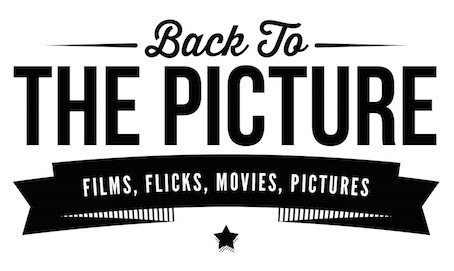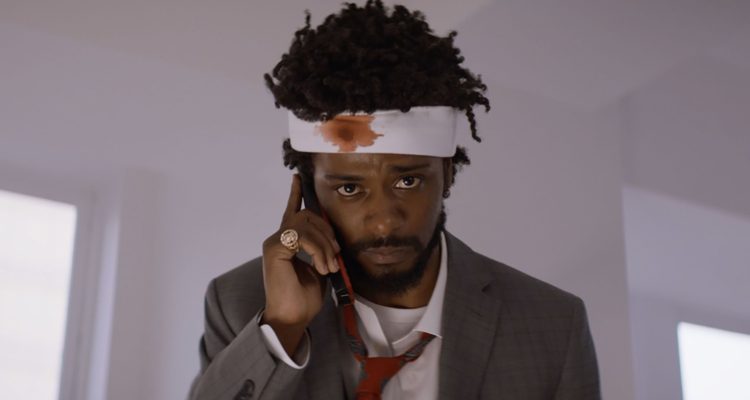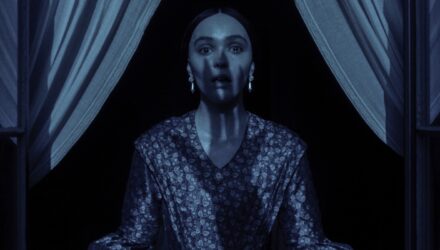I feel like movies like this need to be made more often.
Taking place in what seems to be a weird, parallel universe to our own, Sorry To Bother you follows Cassius “Cash” Green (Lakeith Stanfield), who while living in his uncle’s garage with girlfriend Detroit (Tessa Thompson), decides to take a low paying job at one of the only places that will hire him: a local telemarketing company called RegalView. This decision puts him in a position to buck the current trend of applying for a lifetime contract of work at a company called WorryFree, which, by the way, is under fire for being considered a form of slavery in the modern age. But when Cash has trouble selling anything over the phone during his first few days on the job, an older coworker named Langston (Danny Glover), suggests using his “white voice” (voiced by David Cross) in order to bump up his sales and move up the telemarketing ladder. Before Cash knows it, he’s on the shortlist for a promotion to become a fabled “Power Caller”, but with the outrage over RegalView and WorryFree’s business practices finally coming to a head, riots begin to break out as backlash from a rebellious group named “Left Eye” hits a fever pitch. Now, it’s on Cash to either join the movement to stand up for what is right and just, or sell out for a job that he might already be in over his head with.
Whether it be the idea of a black telemarketer needing a “white voice” to succeed, an interesting angle on society’s idea of a workhorse mentality or even something as simple as selling out at the expense of who you are as a person, Sorry To Bother you has something to say about the state of the world in practically every frame of its being. Not only does director Boot Riley (in his feature film debut nonetheless) find a way to intellectually and intelligently deal with the issues he brings up throughout the film, but he’s also able to imbue the proceedings with that quirky, bizarre feel of an indie film mixed with a full blown Hollywood project, a feat that is rare for a film nowadays, Baby Driver maybe being the only exception.
Coming from a musical background as a member of the hip-hop group The Coup, Riley brings his political and societal views to the silver screen without missing a beat. He is both subversive and satirical in his approach to the script, nailing a lot of the tiny details that help the film work so well in regards to the commentary he’s trying to make, while at the same time allowing enough room for thought as audiences are dragged through the ringer with the oddness and blatant nature of what we’re seeing. Though indirect and purposely vague with a lot of his observations, Riley is able to harness the energy and near pitch perfect performances of literally every actor and actress involved in the production, from Lakeith Stanfield’s bumbling low-key Cash, to Armie Hammer’s gloriously uncomfortable performance as Steve Lift, the head of WorryFree, all the way down to each actor’s “white voice”. Those voices, ranging from the always reliable David Cross to the nerdy and nasally Patton Oswalt, along with nearly everything else presented in the final cut, seem to be laid out and executed in the exact way Riley intended, quirky musical score included, and is a joy to watch when it all comes together in unison, each part of the whole making something truly new and unique as the film moves forward.
And although there’s not much to complain about here, I would have liked to see a little more attention and consequence paid to the overarching ideas in regards to the “Left Eye” rebellion that is sprinkled throughout the script. For most of the runtime, the film seems to be a very self-contained story with hints of what’s happening outside of itself via news clips and the like, but with a certain character ingrained in this organization and taking part in their activities, I was hoping for a bit more exploration here. Other than that, I do have to admit that the film starts to lose itself in its own wackiness towards the third act, but since everything else that happened up until that point was so well crafted and fun to watch, a lot can be forgiven, especially since the commentary during the final act is so strong and fearless in what it’s trying to say. Like I said before, more films like these need to be made and quick.
One of the weirdest and most thought provoking films to come out in recent memory, Sorry To Bother you doesn’t just have one thing to say about society and the issues we collectively face everyday, but many. With a strong sense of direction and a great lead in Lakeith Stanfield, the script could have used a bit more clarification as to what exactly is going on towards the final act, but as long as you pay attention and listen closely to what the filmmakers are trying to tell you, you’ll be just fine.
9
Worth The Bother
The Verdict
9





